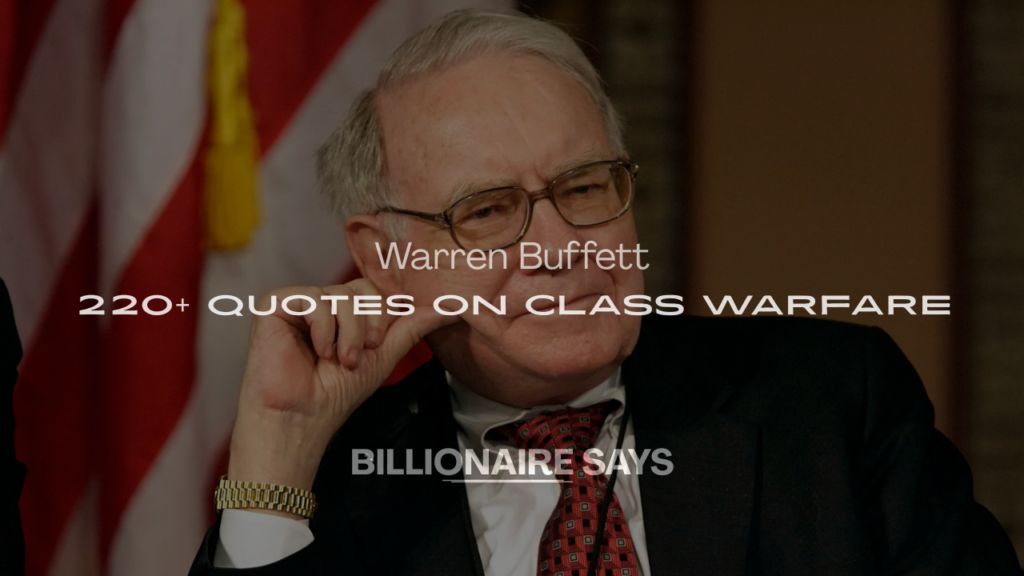Warren Buffett, one of the world’s most successful investors, is known not only for his financial acumen but also for his candid views on wealth, taxes, and economic inequality. His famous remark about class warfare—highlighting the advantages of the wealthy—sparked global conversations about fairness in society. This collection of 220+ Warren Buffett quotes on class warfare offers insights into his thoughts on the growing divide between the rich and everyone else. From sharp observations on tax systems to reflections on societal balance, these quotes, drawn from interviews, articles, and speeches, reveal Buffett’s perspective on economic justice. Perfect for anyone seeking wisdom on wealth and fairness, this compilation, paired with tips on applying these ideas, will deepen your understanding of class dynamics.

220+ Warren Buffett Quotes on Class Warfare
Tax Inequality
- “There’s class warfare, all right, but it’s my class, the rich class, that’s making war, and we’re winning.”
- “It’s class warfare. My class is winning, but they shouldn’t be.”
- “I pay less tax as a percentage of my income than my secretary. How can that be fair?”
- “The tax code is tilted toward the wealthy, and it’s not an accident.”
- “When billionaires pay lower tax rates than teachers, the system is broken.”
- “Fairness in taxes isn’t just moral—it’s essential for a balanced society.”
- “The rich have mastered the art of tax loopholes, and it’s costing everyone else.”
- “A tax system that favors capital over labor isn’t neutral—it’s a choice.”
- “Why should my dividends be taxed less than a worker’s wages?”
- “Class warfare starts when the tax burden falls heaviest on those least able to bear it.”
Wealth Disparity
- “The gap between the rich and the rest isn’t just growing—it’s a chasm.”
- “Wealth concentrates because the rules are written by the winners.”
- “Billionaires aren’t smarter than everyone else—they just play a rigged game.”
- “When a few own everything, it’s not prosperity—it’s imbalance.”
- “The rich don’t need more advantages; they’re already ahead.”
- “Economic inequality isn’t natural—it’s engineered by policy.”
- “Class warfare isn’t about envy; it’s about a system that rewards the few.”
- “The wealthy don’t create the economy—they benefit from it most.”
- “A society where wealth hoards at the top can’t sustain itself.”
- “The real war is between those with too much and those with too little.”
Fairness in Society
- “How can it be right that I pay less tax than my employees?”
- “A fair society doesn’t let the rich skate by while others struggle.”
- “Class warfare thrives when fairness is just a word, not a reality.”
- “The rich should contribute more, not because of guilt, but because it’s just.”
- “Inequality isn’t inevitable—it’s a choice we make as a society.”
- “When the wealthy dodge their share, the burden falls on the working class.”
- “Fairness means everyone pays their part, not just the middle class.”
- “A system that coddles billionaires while workers scrape by isn’t balanced.”
- “Class warfare ends when we prioritize fairness over privilege.”
- “The rich owe society as much as society owes them.”
Economic Policy
- “Policies that favor the rich aren’t neutral—they’re weapons in class warfare.”
- “The tax code is a battlefield, and the wealthy have the best artillery.”
- “Economic rules are shaped by those with the most to gain.”
- “When policy protects wealth over work, class warfare accelerates.”
- “The rich don’t need tax breaks—they need accountability.”
- “A government that prioritizes the wealthy fuels class conflict.”
- “Class warfare is won through laws that tilt the playing field.”
- “Policy should lift everyone, not just those at the top.”
- “The wealthy influence policy to keep their advantages—that’s the real war.”
- “Economic fairness starts with policies that don’t favor the elite.”
Social Responsibility
- “The rich have a duty to give back, not just accumulate.”
- “Wealth is a claim on society’s resources—use it wisely.”
- “Class warfare fades when the wealthy act with responsibility.”
- “Billionaires should lead by example, not by exploitation.”
- “The rich don’t exist in a vacuum—they owe their success to society.”
- “Hoarding wealth while others struggle isn’t success—it’s selfishness.”
- “A responsible wealthy class invests in the common good.”
- “Class warfare grows when the rich forget their societal debt.”
- “Wealth should serve society, not dominate it.”
- “The rich can end class warfare by sharing the burden.”
Systemic Issues
- “The system isn’t broken—it’s built to favor the wealthy.”
- “Class warfare is baked into a system that rewards capital over labor.”
- “The rich don’t win by chance—they win by design.”
- “Systemic inequality is the real weapon in class warfare.”
- “The rules of the game are set by those already winning.”
- “A system that enriches the few at the expense of the many isn’t sustainable.”
- “Class warfare isn’t personal—it’s structural.”
- “The wealthy thrive because the system is stacked in their favor.”
- “Inequality is a feature, not a bug, of our economic system.”
- “To end class warfare, we must rewrite the rules of the game.”
Tax Reform
- “Tax reform is the first step to leveling the class warfare battlefield.”
- “A fair tax system doesn’t let billionaires pay less than workers.”
- “Class warfare won’t end until the tax code stops favoring the rich.”
- “Reforming taxes means making the wealthy pay their share.”
- “The rich should welcome tax reform—it’s their chance to contribute.”
- “A tax code that rewards wealth over work fuels class conflict.”
- “Fair taxes are the antidote to class warfare.”
- “Tax reform isn’t punishment—it’s justice.”
- “The wealthy can afford to pay more, and they should.”
- “Class warfare thrives when taxes protect the elite.”
Economic Justice
- “Economic justice means no one gets a free pass—not even billionaires.”
- “Class warfare ends when everyone shares the load equally.”
- “Justice in economics starts with fairness in opportunity.”
- “The rich don’t deserve special treatment—they deserve accountability.”
- “Economic justice isn’t about taking wealth—it’s about balancing it.”
- “Class warfare is a symptom of an unjust economic system.”
- “A just economy doesn’t let the rich exploit the rest.”
- “Fairness in wealth distribution is the key to ending class warfare.”
- “Economic justice means the system works for all, not just the elite.”
- “Class warfare fades when justice guides economic policy.”
Privilege and Power
- “The rich don’t just have money—they have power to shape the rules.”
- “Privilege is the real weapon in class warfare.”
- “Class warfare is fueled by the unchecked power of the wealthy.”
- “The rich use their influence to keep the system tilted.”
- “Privilege lets the wealthy win before the game even starts.”
- “Class warfare is a battle between privilege and fairness.”
- “The power of wealth distorts democracy and fuels conflict.”
- “The rich don’t need more privilege—they need less advantage.”
- “Privilege protects the wealthy from the consequences of inequality.”
- “Class warfare thrives when privilege goes unquestioned.”
Middle Class Struggles
- “The middle class carries the tax burden the rich avoid.”
- “Class warfare hits hardest on those working to make ends meet.”
- “The middle class isn’t losing by chance—it’s by design.”
- “When the rich pay less, the middle class pays more.”
- “The middle class deserves a system that doesn’t punish hard work.”
- “Class warfare leaves the middle class squeezed between the rich and poor.”
- “The middle class fights battles the wealthy never face.”
- “A system that burdens the middle class fuels class conflict.”
- “The middle class shouldn’t subsidize the wealthy’s tax breaks.”
- “Class warfare thrives when the middle class is left behind.”
Corporate Influence
- “Corporations write the rules, and the rich reap the rewards.”
- “Class warfare is fueled by corporate power over policy.”
- “The wealthy use corporations to shield their wealth from taxes.”
- “Corporate influence tilts the economic game toward the elite.”
- “Class warfare grows when corporations prioritize profits over people.”
- “The rich hide behind corporations to win the class war.”
- “Corporate tax loopholes are a weapon in class warfare.”
- “When corporations rule, the wealthy win and workers lose.”
- “Class warfare is a corporate strategy, not an accident.”
- “The rich and their corporations shape a system that serves them.”
Worker Rights
- “Workers deserve fair pay, not scraps from the rich.”
- “Class warfare pits workers against a system that undervalues them.”
- “The rich win when workers’ rights are ignored.”
- “Fair wages are the first defense against class warfare.”
- “Workers shouldn’t fight for scraps while the wealthy hoard.”
- “Class warfare thrives when workers lack a voice.”
- “The rich prosper when workers’ contributions are underpaid.”
- “A system that exploits workers fuels class conflict.”
- “Workers’ rights are the foundation of economic fairness.”
- “Class warfare ends when workers are valued as much as wealth.”
Education and Opportunity
- “Unequal education fuels class warfare from the start.”
- “The rich buy opportunities others can’t afford.”
- “Class warfare begins when access to education is a privilege.”
- “A fair society gives every child the same shot at success.”
- “The wealthy don’t need better schools—they need to share them.”
- “Education is the battlefield where class warfare is fought.”
- “Opportunity shouldn’t be a luxury for the rich.”
- “Class warfare thrives when education favors the elite.”
- “Equal opportunity means equal access to knowledge.”
- “The rich win when education is a gated community.”
Healthcare Access
- “Healthcare shouldn’t be a luxury for the wealthy.”
- “Class warfare leaves the poor sick and the rich healthy.”
- “The rich don’t worry about medical bills—why should anyone?”
- “A system that denies healthcare to workers fuels class conflict.”
- “Healthcare access is a front line in class warfare.”
- “The wealthy live longer because the system prioritizes them.”
- “Class warfare thrives when healthcare is a privilege.”
- “Fairness means everyone gets care, not just the rich.”
- “The rich don’t face medical debt—that’s a class war casualty.”
- “Healthcare for all is a step toward ending class warfare.”
Housing Inequality
- “The rich own homes; the rest fight for rent.”
- “Class warfare leaves workers homeless while the wealthy profit.”
- “Housing shouldn’t be a battleground for the poor.”
- “The rich drive up prices, leaving others priced out.”
- “Class warfare thrives when shelter is a luxury.”
- “A fair society ensures everyone has a place to call home.”
- “The wealthy don’t face eviction—that’s a class war reality.”
- “Housing inequality is a weapon in the rich’s arsenal.”
- “Class warfare ends when housing is a right, not a privilege.”
- “The rich win when homes become investments, not homes.”
Political Influence
- “The rich buy influence; the rest beg for change.”
- “Class warfare is fought in the halls of power.”
- “The wealthy shape laws to protect their wealth.”
- “Political influence is the rich’s secret weapon in class warfare.”
- “The rich don’t vote for change—they pay to prevent it.”
- “Class warfare thrives when money drowns out voices.”
- “A democracy owned by the wealthy isn’t a democracy.”
- “The rich win when politics serves wealth over people.”
- “Class warfare ends when influence isn’t for sale.”
- “The wealthy’s political power fuels economic inequality.”
Generational Wealth
- “The rich pass down wealth; others pass down debt.”
- “Class warfare ensures the wealthy’s kids start ahead.”
- “Generational wealth is a fortress in the class war.”
- “The rich don’t earn their kids’ wealth—they inherit it.”
- “Class warfare thrives when opportunity is inherited.”
- “A fair system doesn’t let wealth compound across generations.”
- “The rich’s children win before they’re even born.”
- “Generational wealth widens the gap in class warfare.”
- “Equality means no one starts with an unfair advantage.”
- “Class warfare ends when wealth isn’t a birthright.”
Philanthropy’s Role
- “Philanthropy doesn’t fix a system that creates inequality.”
- “The rich shouldn’t choose who gets their scraps.”
- “Class warfare isn’t solved by charity—it’s solved by fairness.”
- “Philanthropy is a Band-Aid on a broken system.”
- “The wealthy’s giving doesn’t balance their taking.”
- “Class warfare thrives when philanthropy replaces policy.”
- “Charity is good, but justice is better.”
- “The rich don’t get to play hero with their tax-deductible gifts.”
- “Philanthropy can’t end class warfare—only reform can.”
- “The wealthy’s generosity doesn’t excuse systemic unfairness.”
Economic Mobility
- “The American Dream is fading because of class warfare.”
- “The rich climb ladders; others face walls.”
- “Class warfare blocks the path to upward mobility.”
- “A system that traps the poor isn’t a meritocracy.”
- “The wealthy don’t need mobility—they’re already at the top.”
- “Class warfare thrives when hard work isn’t enough.”
- “Economic mobility is the casualty of a rigged system.”
- “The rich win when the poor can’t rise.”
- “Fairness means everyone has a shot at moving up.”
- “Class warfare ends when opportunity isn’t a myth.”
Global Inequality
- “Class warfare isn’t just American—it’s global.”
- “The rich exploit the world’s resources, not just their own.”
- “Global wealth concentrates in the hands of a few.”
- “Class warfare crosses borders, but the rich always win.”
- “The wealthy’s gains come at the world’s expense.”
- “Global inequality is a battleground for class warfare.”
- “The rich don’t see borders—they see opportunities.”
- “Class warfare thrives when global systems favor the elite.”
- “A fair world doesn’t let a few hoard the planet’s wealth.”
- “The global rich wage war on the global poor.”
Hope for Change
- “Class warfare can end with courage and reform.”
- “The rich can be allies in fixing inequality.”
- “A fair system benefits everyone, even the wealthy.”
- “Change starts when we challenge the rules of class warfare.”
- “The wealthy can choose fairness over victory.”
- “Class warfare isn’t inevitable—it’s reversible.”
- “Hope lies in policies that prioritize the many, not the few.”
- “The rich don’t have to win—we can rewrite the game.”
- “A balanced society is possible if we act together.”
- “Class warfare ends when we choose justice over greed.”
Buffett’s Legacy
- “I hope my legacy is fairness, not just wealth.”
- “Class warfare shaped my views, but fairness drives my actions.”
- “Being rich doesn’t mean ignoring the war I’m part of.”
- “My wealth is a tool to challenge class warfare.”
- “I speak on class warfare because silence is complicity.”
- “The rich must lead the charge against inequality.”
- “My legacy isn’t my money—it’s my call for fairness.”
- “Class warfare taught me the system needs fixing.”
- “I’m a billionaire, but I’m not blind to class conflict.”
- “Ending class warfare is the legacy I want to leave.”
Understanding the Appeal of Buffett’s Quotes
Why These Quotes Resonate
Buffett’s quotes on class warfare strike a chord because they come from an unlikely source—a billionaire admitting the system’s flaws. His candor, as seen in “There’s class warfare, all right, but it’s my class, the rich class, that’s making war, and we’re winning,” exposes economic truths many avoid. These 220+ Warren Buffett quotes on class warfare resonate by blending sharp critique with a call for fairness, appealing to those seeking justice in an unequal world.
The Role of Buffett’s Voice
As a billionaire, Buffett’s voice carries weight. His critiques of tax inequality and wealth disparity cut through because he’s part of the elite he criticizes. His quotes inspire reflection and action, offering a rare insider’s perspective on how the wealthy maintain their edge and why reform is needed.
The Emotional Impact of Buffett’s Quotes
Sparking Awareness
Quotes like “When billionaires pay lower tax rates than teachers, the system is broken” jolt readers into recognizing systemic unfairness. They evoke frustration but also hope, urging people to question policies that favor the rich and demand change.
Building Solidarity
Buffett’s words foster a sense of shared purpose. By admitting “The rich don’t need more advantages; they’re already ahead,” he aligns with those feeling squeezed by inequality. His quotes encourage collective action, bridging divides between classes.
How to Use These Quotes in Your Life
Inspire Conversations
Share a quote like “The tax code is tilted toward the wealthy, and it’s not an accident” at a discussion group or family gathering. Use it to spark dialogue about fairness, taxes, or policy without assigning blame. Buffett’s authority makes his words a powerful conversation starter.
Advocate for Change
Incorporate quotes into letters to policymakers or community discussions. For example, “Fair taxes are the antidote to class warfare” can underscore the need for tax reform. Pair Buffett’s wisdom with data to strengthen your case for economic justice.
Choosing the Right Quote for the Moment
Match the Context
Select a quote that fits the setting. For a policy debate, use “Policies that favor the rich aren’t neutral—they’re weapons in class warfare.” For a personal reflection, try “The rich owe society as much as society owes them.” Context ensures impact.
Consider the Audience
Tailor quotes to your listeners. Students might connect with “Unequal education fuels class warfare from the start,” while workers resonate with “Workers deserve fair pay, not scraps from the rich.” Choose quotes that speak to their experiences.
Building a Fairer Future with Buffett’s Wisdom
Daily Reflection
Make Buffett’s quotes a daily habit. Start your morning with “Class warfare ends when we prioritize fairness over privilege” to focus on justice. Write it in a journal or share it with a friend to keep the conversation alive.
Create a Quote Ritual
Keep a notebook of favorite quotes. Each day, pick one like “Economic justice means no one gets a free pass—not even billionaires” to reflect on or discuss. This ritual embeds Buffett’s insights into your worldview, fostering a commitment to fairness.
Turning Wisdom into Action
Make It Interactive
Host a quote discussion group, sharing favorites like “The rich don’t just have money—they have power to shape the rules.” Encourage others to interpret and apply Buffett’s words, turning ideas into plans for advocacy or reform.
Advocate for Reform
Use quotes to fuel activism. Include “Tax reform is the first step to leveling the class warfare battlefield” in petitions or speeches to rally support for fair policies. Buffett’s words lend credibility to your efforts.
The Lasting Power of Buffett’s Quotes
Spreading Awareness
These quotes do more than inform—they awaken. Sharing 220+ Warren Buffett quotes on class warfare spreads understanding of economic inequality, inspiring others to question the status quo and push for change.
Living with Purpose
Buffett’s wisdom encourages purposeful living. Quotes like “Class warfare isn’t inevitable—it’s reversible” remind us to act with intention, advocating for a society where fairness, not wealth, defines success.
Conclusion
Warren Buffett’s insights on class warfare cut through the noise of economic debates, offering clarity and conviction. These 220+ Warren Buffett quotes on class warfare illuminate the systemic advantages of the wealthy and the need for fairness in taxes, policy, and opportunity. From sharp critiques to hopeful calls for reform, they inspire reflection and action. Keep these quotes close, share them widely, and let them guide you toward a more just world where class warfare gives way to economic balance.
FAQs
Q. How can I use Buffett’s quotes in daily life?
Share a quote like “The rich should contribute more, not because of guilt, but because it’s just” in conversations or presentations to spark discussions about fairness and policy.
Q. What if I’m not good at explaining economic issues?
Choose simple quotes like “When billionaires pay lower tax rates than teachers, the system is broken.” Practice sharing them with a clear, personal perspective—Buffett’s words carry the weight.
Q. How do I pick the right Buffett quote?
Match the quote to the context and audience. Use “Fair taxes are the antidote to class warfare” for policy talks or “The middle class carries the tax burden the rich avoid” for workers.
Q. Can Buffett’s quotes really inspire change?
Yes! Quotes like “Class warfare ends when we choose justice over greed” motivate advocacy and reform by highlighting systemic issues with authority and clarity.
Q. How do I share these quotes effectively?
Use quotes naturally in discussions or writings, like “The system isn’t broken—it’s built to favor the wealthy.” Pair them with real-world examples to make them relatable and impactful.










